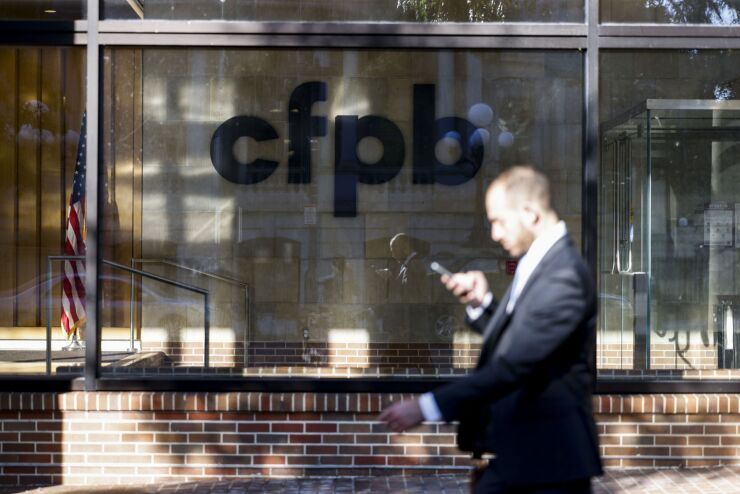
Despite a
A recent
"Forty-four percent are planning on making a change to compete with larger banks," said Paul Weinstein, a senior policy advisor at IntraFi. "So, it's going to have an impact."
Yet, 58% executives who responded to IntraFi's most recent quarterly Bank Executive Business Outlook Survey — the vast majority of whom work for community banks — said they would have to do something in response to the change, just keep pace with the firms that are subject to it.
The most common strategy was to lower fees to keep prices on par with their larger competitors, at 44%. Another 35% said they would alter their overdraft policy in some other way, while 27% said they would raise the cost associated with other services and 1% said the change would cause them to seek out a partnership or merger. Participants were allowed to select multiple options.
Responses to IntraFi's emailed survey came in from CEOs, presidents, chief financial officers and chief operating office from nearly 500 unique banks throughout the country.
Weinstein said the findings demonstrate why the Independent Community Bankers of America — an industry group representing small banks — has come out against the CFPB's overdraft cap proposal. He added that it might portend greater scrutiny of the rule moving forward.
"Regulators, because of the exemption, were probably hoping this would not be an issue for smaller banks, but what we're seeing is that, for many, it is," he said. "This means opposition to the rule will be stronger and it will probably get more of a look from Congress."
The survey found that other policy changes being considered or implemented by regulators are of less concern to the smaller bank executives surveyed. More than 80% of respondents said they planned to make no changes in response to CFPB's $8 cap on late fee charges on credit card payments, which Weinstein said reflects the fact that many community banks do not issue credit cards.
The $8 late fee cap is the subject of an
Meanwhile, the Federal Reserve Board of Governors has proposed a lower cap on the fees banks can charge merchants for
More than 30% of respondents said they would make some kind of change related to the cap, even though it, too, would provide an exemption for banks with less than $10 billion of assets. More than a quarter of banks said they would raise the fees associated with other service offerings to offset the lost revenue, while 16% would reduce or eliminate free checking account offerings.
"This is another situation in which the regulators probably thought the exemption would mean smaller banks wouldn't be concerned about this, but we're seeing that some under that $10 billion threshold are still planning on doing something," Weinstein said.
The survey also covered a range of economic issues.
More than 85% of respondents said their funding costs are higher than they were a year ago and nearly 70% said they are facing a more competitive environment for deposits. Weinstein said these levels are consistent with recent trends, but suggest a slightly more favorable environment than what bankers have reported in recent quarters.
"A high percentage of banks are seeing higher funding costs, but it's actually down roughly 10% compared to last year," he said. "Still, overwhelmingly, most banks feel like funding costs are going up and competition for deposits is getting tighter, even though softer loan demand offsets some of the need for deposits."
Opinions among respondents are split as to whether this trend of higher costs will continue into 2025: 41% say funding will continue to be more expensive, 32% say it will be less and 26% believe it will remain steady. For deposit competition, expectations were more evenly split between increasing — at 49% — and remaining the same, at 43%.
"Banks are like the rest of us, waiting on more information," Weinstein said. "Things seem to be heading in a positive direction but they, like many in the market, are nervous about what the Fed will do on interest rates going forward. That's a big piece of how they look at the economy because it impacts so much of what they do."






